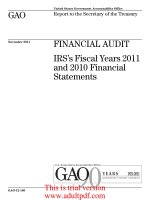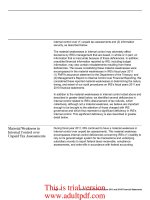United States Government Accountability Office GAO November 2011 Report to the Secretary of the Treasury_PART3 potx
Bạn đang xem bản rút gọn của tài liệu. Xem và tải ngay bản đầy đủ của tài liệu tại đây (73.4 KB, 1 trang )
Management Discussion and Analysis
Page 25 GAO-12-165 IRS’s Fiscal Years 2011 and 2010 Financial Statements
INTERNAL REVENUE SERVICE
Management Discussion and Analysis
For the Fiscal Year Ended September 30, 2011
3
Return Preparer Initiative
One of the most important initiatives that
the IRS has undertaken in recent memory
is the return preparer initiative, which is
now being implemented. In September
2010, the IRS launched the new online
PTIN (Preparer Tax Identification Number)
application system. The system is up and
running with over 735,000 preparers
already registered in the system. More
than just an identification number, the
PTIN registration process gives the IRS an
important and better line of sight into the
return preparer community than the IRS
has ever had before. It allows for
leveraging information to better
communicate, analyze trends, spot
anomalies, and potentially detect fraud.
The registration process will help IRS
build, in several years, a publicly-
accessible database of preparers who are
authorized to prepare returns. This is an
extremely important tool for consumers as
they will be able to search the database to
ensure that their preparer is registered. In
2011, the IRS also:
♦ Amended Circular 230 to create a
new registered tax return preparer
credential, extend ethical rules to all
paid preparers, create new rules
applicable to continuing education
providers, broadened the definition of
practice to include return preparation,
and numerous other revisions.
The IRS provided return preparer initiative
outreach and education by arranging to
have agency officials make presentations
and provide outreach at key stakeholder
events and use a range of communication
tools for sharing information.
The IRS also maintains an enforcement
presence in the return preparer com-
munity. FY 2011 accomplishments include:
♦ Completing 240 undercover visits.
♦ Conducting 93 Knock and Talk visits
with identified at-risk preparers.
♦ Initiating 378 Return Preparer
Program (RPP) investigations.
♦ Achieving 163 RPP convictions.
♦ Issuing 10,000 letters and visiting
more than 5,000 preparers for
noncompliance with multiple areas of
concern that include EITC, e-file, and
certified acceptance agents.
Fiscal Year (FY) 2011 Performance
In FY 2011, the IRS achieved an overall success rate of 84% in meeting
or exceeding the targets for 27 of its 32 performance measures, a 27%
increase compared to FY 2010. Two of the five measures that fell below
the target were within 1% of the target. Detailed information on
performance is contained in Appendix B, Performance Measurement
Data; and Appendix C, Explanation of Shortfalls.
Actual Performance Measures
83%
83%
56%
89%
50%50%
0%
25%
50%
75%
100%
FY 2010 FY 2011
Taxpayer Service Enforcement Business Systems Modernization
Collections related to enforcement activities totaled $55.2 billion for FY
2011, a 17% increase over FY 2005.
IRS Enforcement Revenue ($ Billions)
47.3
48.7
59.2
56.4
48.9
57.6
55.2
0
10
20
30
40
50
60
FY05 FY06 FY07 FY08 FY09 FY10 FY11
Research studies and analytics provide measures of taxpayer
compliance and the tax gap, which influences taxpayer compliance and
IRS enforcement activities. In FY 2011, the National Research Program
(NRP) completed individual reporting compliance studies that will be
used to update tax gap estimates scheduled to be released in FY 2012.
Updated estimates also incorporate an enhanced methodology to
calculate the individual income tax nonfiling gap. NRP also delivered
data for the S-corporation reporting compliance study and updated
payment compliance estimates for tax years 2006 through 2009. For the
first time in 30 years, the IRS also began designing a corporate income
tax reporting compliance study to obtain valuable information on the
compliance behaviors of corporate filers. The study will cover a sample
of corporate returns from tax year 2010.
The IRS continues to improve its methods to identify noncompliance. In
FY 2011, the Compliance Data Warehouse (CDW), an IRS system that
integrates tax data from numerous sources to enable quick and easy
access by IRS researchers via third-party tools, was named the 2011
Best Practices Awards winner, in the category of government/non-profit,
by the Data Warehousing Institute. CDW was honored for demonstrating
best practices in business intelligence, data warehousing, or related
areas of data management. This is the fourth industry award for CDW in
the last four years.
This is trial version
www.adultpdf.com









